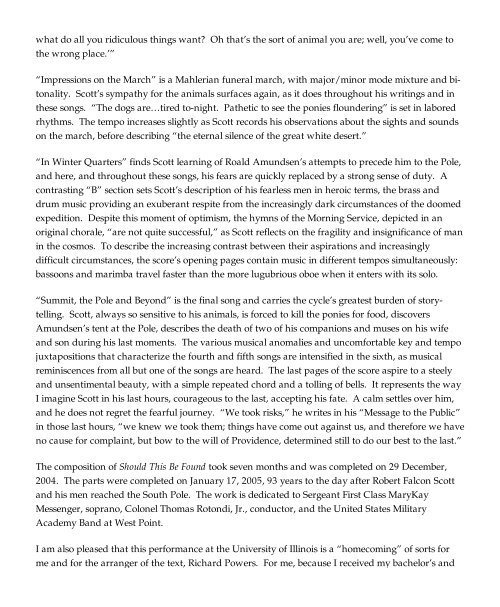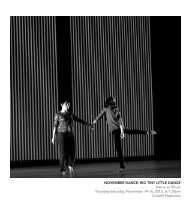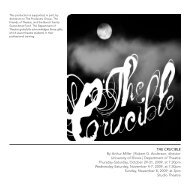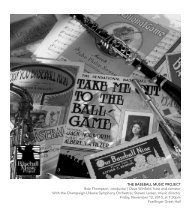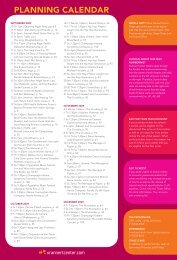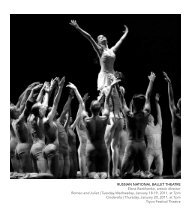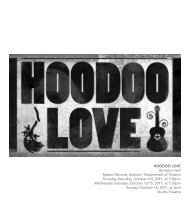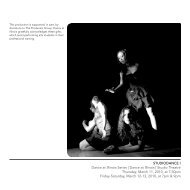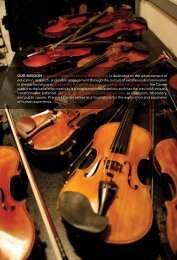Program - Krannert Center for the Performing Arts
Program - Krannert Center for the Performing Arts
Program - Krannert Center for the Performing Arts
You also want an ePaper? Increase the reach of your titles
YUMPU automatically turns print PDFs into web optimized ePapers that Google loves.
what do all you ridiculous things want? Oh that’s <strong>the</strong> sort of animal you are; well, you’ve come to<strong>the</strong> wrong place.’”“Impressions on <strong>the</strong> March” is a Mahlerian funeral march, with major/minor mode mixture and bitonality.Scott’s sympathy <strong>for</strong> <strong>the</strong> animals surfaces again, as it does throughout his writings and in<strong>the</strong>se songs. “The dogs are…tired to-night. Pa<strong>the</strong>tic to see <strong>the</strong> ponies floundering” is set in laboredrhythms. The tempo increases slightly as Scott records his observations about <strong>the</strong> sights and soundson <strong>the</strong> march, be<strong>for</strong>e describing “<strong>the</strong> eternal silence of <strong>the</strong> great white desert.”“In Winter Quarters” finds Scott learning of Roald Amundsen’s attempts to precede him to <strong>the</strong> Pole,and here, and throughout <strong>the</strong>se songs, his fears are quickly replaced by a strong sense of duty. Acontrasting “B” section sets Scott’s description of his fearless men in heroic terms, <strong>the</strong> brass anddrum music providing an exuberant respite from <strong>the</strong> increasingly dark circumstances of <strong>the</strong> doomedexpedition. Despite this moment of optimism, <strong>the</strong> hymns of <strong>the</strong> Morning Service, depicted in anoriginal chorale, “are not quite successful,” as Scott reflects on <strong>the</strong> fragility and insignificance of manin <strong>the</strong> cosmos. To describe <strong>the</strong> increasing contrast between <strong>the</strong>ir aspirations and increasinglydifficult circumstances, <strong>the</strong> score’s opening pages contain music in different tempos simultaneously:bassoons and marimba travel faster than <strong>the</strong> more lugubrious oboe when it enters with its solo.“Summit, <strong>the</strong> Pole and Beyond” is <strong>the</strong> final song and carries <strong>the</strong> cycle’s greatest burden of storytelling.Scott, always so sensitive to his animals, is <strong>for</strong>ced to kill <strong>the</strong> ponies <strong>for</strong> food, discoversAmundsen’s tent at <strong>the</strong> Pole, describes <strong>the</strong> death of two of his companions and muses on his wifeand son during his last moments. The various musical anomalies and uncom<strong>for</strong>table key and tempojuxtapositions that characterize <strong>the</strong> fourth and fifth songs are intensified in <strong>the</strong> sixth, as musicalreminiscences from all but one of <strong>the</strong> songs are heard. The last pages of <strong>the</strong> score aspire to a steelyand unsentimental beauty, with a simple repeated chord and a tolling of bells. It represents <strong>the</strong> wayI imagine Scott in his last hours, courageous to <strong>the</strong> last, accepting his fate. A calm settles over him,and he does not regret <strong>the</strong> fearful journey. “We took risks,” he writes in his “Message to <strong>the</strong> Public”in those last hours, “we knew we took <strong>the</strong>m; things have come out against us, and <strong>the</strong>re<strong>for</strong>e we haveno cause <strong>for</strong> complaint, but bow to <strong>the</strong> will of Providence, determined still to do our best to <strong>the</strong> last.”The composition of Should This Be Found took seven months and was completed on 29 December,2004. The parts were completed on January 17, 2005, 93 years to <strong>the</strong> day after Robert Falcon Scottand his men reached <strong>the</strong> South Pole. The work is dedicated to Sergeant First Class MaryKayMessenger, soprano, Colonel Thomas Rotondi, Jr., conductor, and <strong>the</strong> United States MilitaryAcademy Band at West Point.I am also pleased that this per<strong>for</strong>mance at <strong>the</strong> University of Illinois is a “homecoming” of sorts <strong>for</strong>me and <strong>for</strong> <strong>the</strong> arranger of <strong>the</strong> text, Richard Powers. For me, because I received my bachelor’s and


